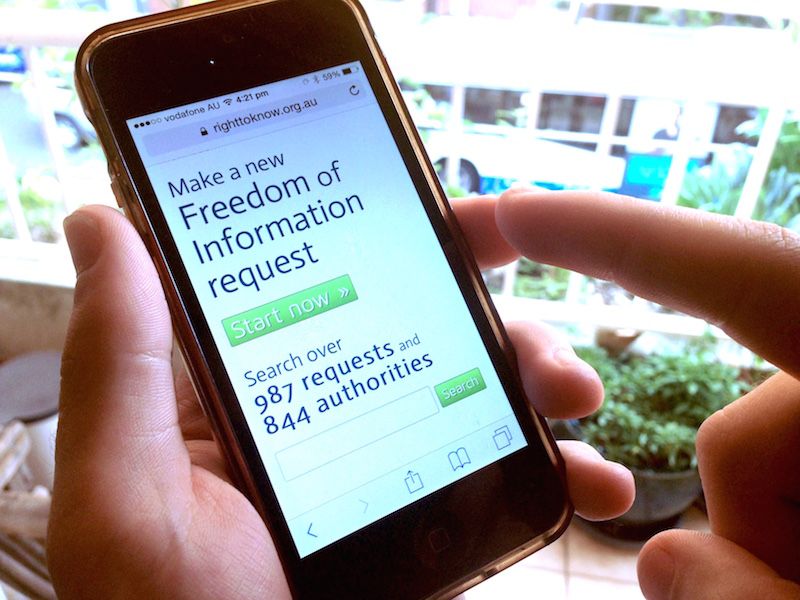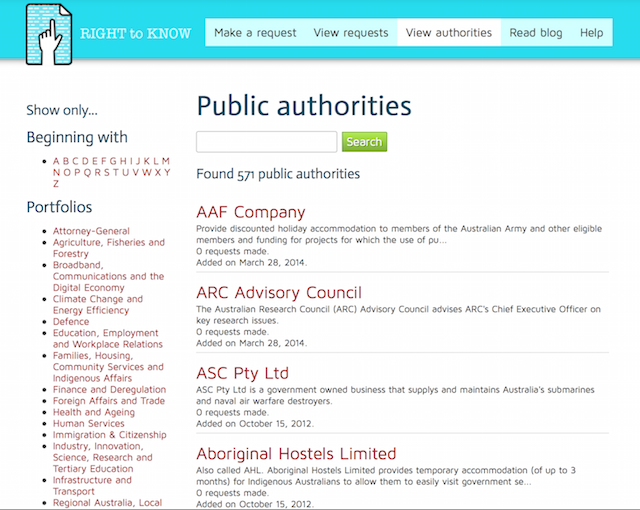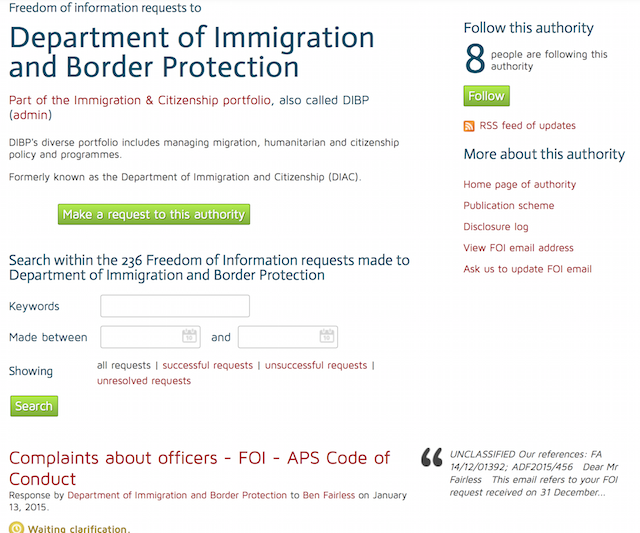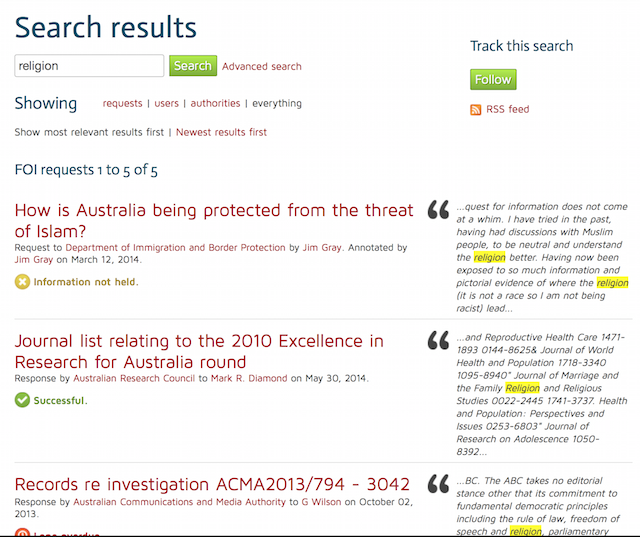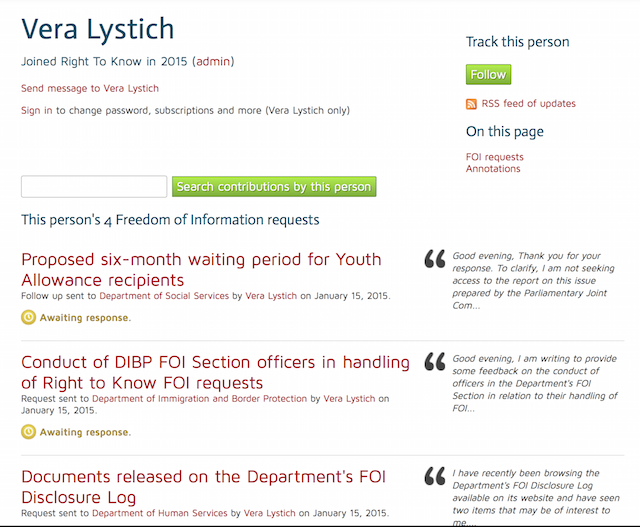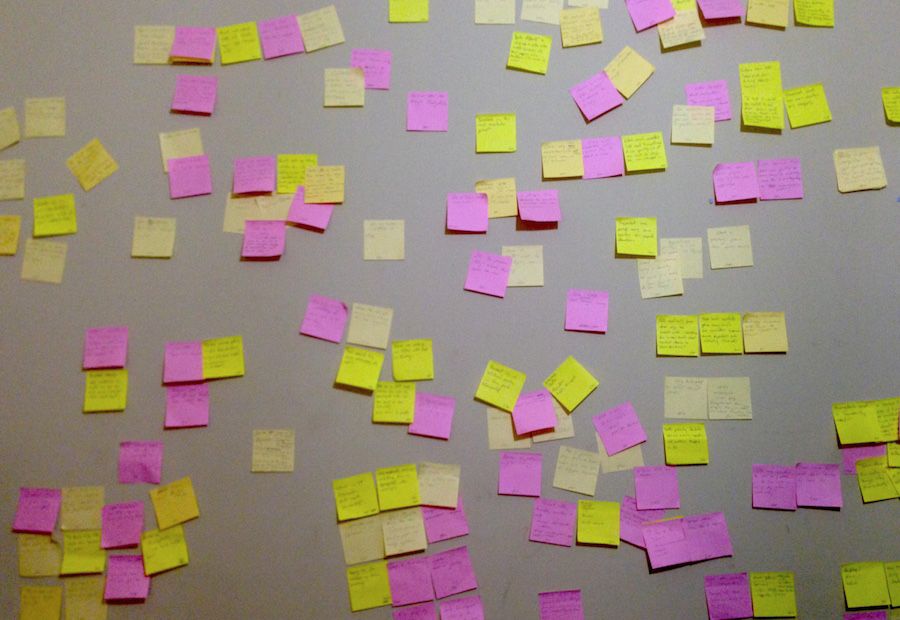
A mess of post-its: collecting and sorting observations made while speaking with our supporters.
Over the last couple of weeks we’ve been reviewing and trying to improve the way the OpenAustralia Foundation handles donations. While there are tens of thousands of people using our projects, over the past few years we’ve only received a very small amount of funding from small donations by individuals.
We know that many people are enthusiastic about our projects and so contribute their time and skills. Last year we launched a monthly meetup for people like this and it’s been a great success. There are also other people who aren’t able to contribute code or are busy. They can still support us with financial donations. We’d like to make this process a lot simpler and rewarding for those people, and of course increase this kind of donation.
Research aims and process
Reaching out and getting to know the individuals that have donated to us has been an one key goal of this mini-project. We’ve been follow the process for design research set out in Erika Hall’s excellent book, Just Enough Research:
- Define the problem
- Select the approach
- Plan and prepare
- Collect the data
- Analyse the data
- Report the results
Our goal, or problem statement is:
Describe the kinds of people who donate to the OpenAustralia Foundation and why they do it.
Because the number of number of people who had donated to the Foundation is quite small, we decided to contact them with a small survey and then conduct short semi-structured interviews with as many as possible. This would give us a chance to thank these awesome people, establish a connection with them and find out how they see the world. To quote Hall:
The goal of interviewing users is to learn about everything that might influence how the users might use what you’re creating.
Finally we would collect and analyse our data and then present the findings in a blog post (here it is).
Survey
We sent a very short Google Forms survey to the 160 people who have donated to the OpenAustralia Foundation.
The questions were:
- Roughly, how old are you? (Under 20, 20s, 30s, 40s, 50s, 60s, 70s, Above 80)
- What is your occupation?
- Which OpenAustralia Foundation projects are you familiar with?
- Do you regularly donate money to organisations or projects?
- Why did you donate to the OpenAustralia Foundation?
- Would you be happy to have a brief chat to help us learn more?
The idea was to try and keep the survey as short as possible so that people would fill it out and be happy to chat, whilst prompting some useful insights.
So far we’ve received 38 responses. Here’s a basic summary of the responses:
- Over 90% of respondents were over 30 years old, with 75% being evenly distributed between 30s, 40s and 50s.
- After categorising the occupation responses, IT/Tech was the most group, followed by retired and professional services. There were two smaller groups working in government and in civil society organisations.
- 75% of respondents said they were familiar with PlanningAlerts, 65% OpenAustralia.org and 50% Election Leaflets. 45% were familiar with They Vote For You, 40% Right To Know and 10% morph.io.
- 65% of people said they regularly donated money to organisations or projects.
While we are dealing with a small amount of data, this information is helping turn some of our assumptions into knowledge.
Twenty-one people were happy to be interviewed and so far we’ve spoken with eleven. It’s been a pleasure to learn about the people who use our projects. A few very generous people even made donations after speaking with us.
While the survey was a few basic questions, the interviews were a deep dive. We wanted to get to know these people and find out about their relationships with NGOs, their needs and concerns.
So what did we learn?
Passionate and knowledgeable in their area of focus
The people that we spoke to were passionately interested and knowledgeable in their chosen area of focus. For a number of them, that was local planning and they were either working professionally in the area or were members of resident action groups.
These people are using one of our projects as part of a wider project or campaign they were active in.
Here are some of our observations about who these donors are:
- These donors are generally quite self directed. Many of them were self-employed, involved in community action groups, or had established independent projects of some kind.
- A number of people were involved with local community organisations.
- The people we spoke to who were using PlanningAlerts (most people), had acted upon information they had received in an alert by making a submission to council.
- People who donated made little use, if any, of more than one OpenAustralia Foundation project. They were often aware of a number of them, but were only an active user of one project. In the survey, a quarter of people selected just one project that they were familiar with.
- Most people we spoke to had discovered their first OpenAustralia Foundation project by being directly introduced to it, often by someone from the foundation, rather than finding it through Google or social media.
- Everyone we spoke to had found the OpenAustralia Foundation through one of the projects, not the other way round.
- Everyone we spoke to was computer and web savvy, a number of them having experience with programming or data management.
In the survey there were two very clear themes in the responses to the question “Why did you donate to the OpenAustralia Foundation?”
- Because they support the values of the OpenAustralia Foundation
- Because they get value from an OpenAustralia Foundation project and want it to continue
These two themes came through strongly in the interviews—in particular it was clear that these people were successfully using one of the projects.
In the survey the majority of people mentioned their support for the general mission of the OpenAustralia Foundation to create better access to civic information. Some examples:
- “Because I believe in OpenAustralia and the ideals therein”
- “I believe public, open access to parliamentary records is important, and that politicians need to be held to greater account. They Vote For You is a step in the right direction to holding politicians accountable.”
- “Believe in freedom of information, open and transparent government, open data – that governments should be more transparent, should publish the information they produce – briefings, data, revenue and expenditure detail – as a matter of course, without the need for FOI requests from the public or journalists.”
- “I believe in your open data/technology agenda whole heartedly. Democracy is a closed broken old boys club and needs to be re-designed and re-built.”
“Because it provides a service I use!”
Many people also said they donated because they were getting value from one of the projects and wanted to support it. Examples:
- “Because of the free service offered and that donations are what keep [organisations] like this going.”
- “As a small thank you for the emails (about my MP’s speeches in Parliament) that you make it possible for me to receive without having to read/search all of Hansard!”
- “I use the PlanningAlerts service and I value it. I also highly regard OpenAustralia Foundation and the sense of transparency and freedom it brings into the society”
- “Because it does provide a useful service, making me aware of up coming proposed planning applications in my immediate neighbourhood that I might otherwise have not been aware of. Due to this early notification I have had some success with council and even VCAT in influencing the resulting plans to maintain respectful scale and privacy within my immediate neighbourhood.”
- “i use it”
People don’t need to know much about OAF to donate to it, but appreciate a clear explanation when they ask
The majority of people that we spoke to knew very little about the OpenAustralia Foundation. Those who did know about the Foundation had an accurate picture of our size and structure. No-one thought the OpenAustralia Foundation was a large, well funded institution.
A number of people who had donated also donated to other non-profit websites. Wikipedia, Getup, Mozilla and Black Box Voting were mentioned.
There were quite a few questions about how the OpenAustralia Foundation is funded. A majority of people mentioned that they were concerned by the amount of money NGOs put into marketing rather than their core mission. They appreciated it when they received a clear answer from the NGO they were questioning.
People like to receive updates but appreciate brevity
Donors were generally positive about receiving regular email updates from the organisations or campaigns they supported. There were strong bad reactions to being signed up to campaigns they did not support.
People who receive organisation update emails from liked concise messages that were quick to read and scan.
A few people mentioned that the email newsletters they liked were ones that gave them some actionable information: TV shows to note down to watch or facts about the issues they were interested in to discuss with friends.
What now
In designing the way we handle donations, we don’t want to just follow the standard path. Everything we do should be focused on making our projects more useful and effective to more citizens.
The insights gained through this initial research will provide a basis for more experiments to see how we can help new groups of people get use from and support our work. We’ve already got some on the boil.
